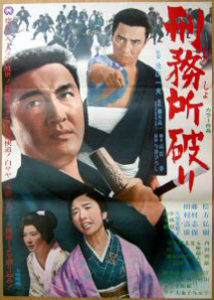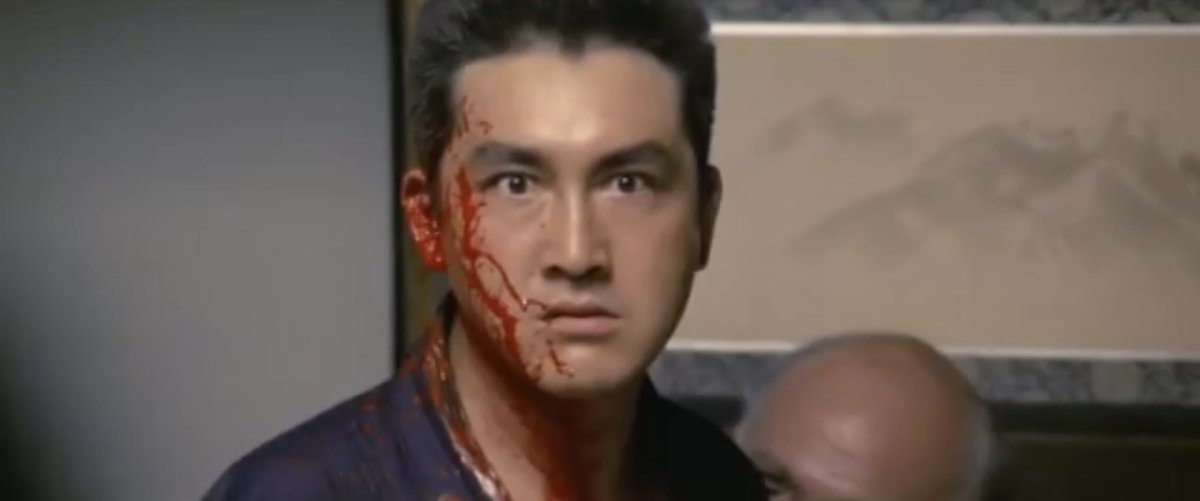 A standout entry in Japan’s ninkyo yakuza genre. PRISON BREAK was one of five films directed by the prolific Kazuo Ikehiro in 1969, and is widely believed to be the best thing he and actor Matsukata Hiroki ever did in the genre.
A standout entry in Japan’s ninkyo yakuza genre. PRISON BREAK was one of five films directed by the prolific Kazuo Ikehiro in 1969, and is widely believed to be the best thing he and actor Matsukata Hiroki ever did in the genre.
Tokyo, circa 1926: the master swordsman Furuta Makoto enters a yakuza meeting in which he brutally kills Tomiya, the boss, and nearly everyone else who happens to be present. Quite an opening, I must say!
From there things get complicated. Furuta takes refuge in a brothel, where he reveals the reasons for his actions: he was informed that Tomiya was behind the recent murder of his father Toyoji. Unfortunately he’s overheard revealing this info by a Tomiya-connected whore, who quickly informs her fellows. In the process it’s revealed that Toyoji was not actually killed by Tomiya, but rather Naya Oyabun, the leader of a rival gang to which Furuta has pledged his loyalty, who was looking to consolidate his power by conning Furuta into killing Tomiya.

From there Furuta, understandably ashamed of being duped by Oyabun, relocates to another city. There he becomes involved in a rivalry between the Ohara and Tennoji corporations, the latter of which is yakuza-run. Furuta attempts to negotiate on the Ohara group’s behalf with the leader of the Tennojis, via a card game upon which Furuta literally bets his life. The Tennoji’s leader attempts to win by cheating, but Furuta won’t have it.
This leads to a massive slash-a-thon between Furuta, the Tennoji group and Furuta’s yakuza “brother” Tsunetaro. The latter is killed in the melee and Furuta winds up in prison. While incarcerated Furuta learns that the Tennoji group has been up to no good, and he grows determined to stop them. First, though, he’ll have to deal with Sato, a dangerous assassin with whom he shares a jail cell.
Luckily another prisoner smuggles a knife into the prison, which Furuta uses to stab Sato to death in the prison’s communal bath. In the chaos that follows Furuta succeeds in escaping via a makeshift rope he uses to climb over a prison wall. From there he heads to the Tennoji headquarters for a final showdown that, you can rest assured, will be plenty bloody.
The film is marred by an overly complex, exposition-heavy narrative that doesn’t leave director Kazuo Ikehiro much room for the type of visual and thematic nuance that elevated Japanese classics like SWORD OF DOOM and the LONE WOLF AND CUB series (both of which PRISON BREAK resembles in part). It is well made, however, with a great deal of kinetic energy that nearly makes up for the top-heavy narrative.
Where the film really excels is in its many ultra-savage swordfights, in which Furuta is shown facing down dozens of swordsmen he invariably dispatches in spectacularly bloody fashion. It’s no exaggeration to call PRISON BREAK one of the goriest films of its type, with geysers of blood and hacked-off limbs delivered by the strikingly stoic Matsukata Hiroki in the lead role (which was reportedly conceived as a more staid and intellectual personage than what emerged). In short, PRISON BREAK is a blast, even if it is somewhat hard to follow.
Vital Statistics
PRISON BREAK (MUSHO YABURI)
Daiei Company
Director: Kazuo Ikehiro
Producer: Masahiko Inagaki
Screenplay: Takaiwa Hajime
Cinematography: Hiroshi Imai
Editing: Toshio Taniguchi
Cast: Hiroki Matsukata, Shiho Fujimura, Takahiro Tamura, Ryuji Kita, Naoko Kubo, Asao Uchida, Rinichi Yamamoto, Akiji Kobayashi, Hachiro Oka, Manabu Morita, Eizo Kitamura, Ryutaro Gomi, Ikuko Mori, Yashuhiro Minakami, Gen Kimura, Yuzo Hayakawa
